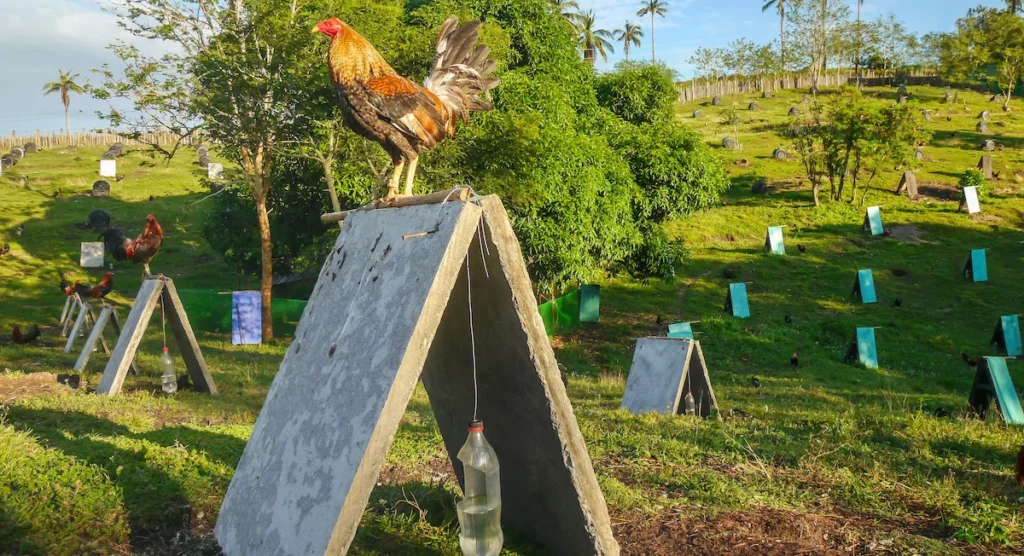Animal welfare group urged support for an ordinance, similar to measures adopted by 20 other California counties, to restrict private ownership of roosters for no reason other than cockfighting.
Sacramento, CA — Animal Wellness Action expressed deep disappointment in the Tulare County Board of Supervisors for voting to take no further action on a policy to address widespread possession of roosters for cockfighting in the sprawling, agriculturally oriented Central Valley county.
Animal Wellness Action presented detailed evidence about the presence of cockfighting in Tulare County, its connection to a wide range of crimes, and its threat to legitimate agricultural operations. In spite of detailed evidence about concerns about this illegal enterprise, the Board of Supervisors instead chose to take no action after about 30 cockfighting enthusiasts, masquerading as “gamefowl enthusiasts,” spoke against the measure and argued it was an assault on their constitutional rights.

“Many major agricultural counties in California adopted a limitation on private ownership of roosters, with appropriate exemptions for legitimate agricultural operations,” said Wayne Pacelle, president of Animal Wellness Action. “They did so because they understood that cockfighters were illegally operating there and they wanted to halt animal cruelty, other crimes interwoven with the cockfighting operations, and the spread of deadly avian diseases. Sadly, the Board of Supervisors did not see through the masquerade presented at the hearing. It was cockfighters, and not legitimate animal owners, who won the day in Tulare County today.”
“A leader of the Association for the Preservation of Gamefowl, based in Tulare County, opposed the ordinance and said he opposed cockfighting,” said Eric Sakach, the nation’s leading court-certified expert on cockfighting and the national law enforcement consultant to Animal Wellness Action. “For anyone who understands the working of this organization, that is laughable. The very purpose of the organization is to protect cockfighting by having its members masquerade as gamefowl enthusiasts.”
The Association for the Preservation of Gamefowl, which is based in California, donated $5,000 to an Oklahoma-based cockfighting group this year to try to repeal the state law against cockfighting.
Animal Wellness Action has conducted investigations of illegal cockfighting operations in the county and documented dozens of major gamecock operations. These birds are distinctly cockfighting birds — with distinct breeds used in cockfighting, housed in ways characteristic of cockfighting, and who would have no other legitimate purpose for rearing in these numbers and at this density.
In staged fights, roosters have knives or gaffs (curved, icepick-like implements) strapped to their legs and they slash each other to death. The birds suffer gouged eyes, punctured lungs, and other grievous wounds for human entertainment and illegal gambling.
In 2020, Animal Wellness Action obtained avian shipping records to Guam and uncovered more than 11,500 fighting birds sent from the mainland to this U.S. territory. Only Oklahoma cockfighters sent more birds to Guam for fighting than California, exposing massive contraband originating in California. Dr. Thomas Pool, the former territorial veterinarian for Guam, submitted testimony arguing that many of the illegally transported birds that were discovered on Guam came from California.
Federal law bans it everywhere in the United States, and most states themselves banned it in the 19th Century. California banned cockfighting in 1905, but the staged battles remain as the state’s most widespread form of illegal animal cruelty.
Cockfighting tied to dangers disease outbreaks
Ten of the 15 virulent Newcastle Disease outbreaks in the United States originated from illegally smuggled game fowl for cockfighting, causing major disease epidemics in southern California in 2002-03 and 2018-20. At least 16 million birds died and more than $1 billion (inflation-adjusted numbers) was spent to control vND outbreaks.
“Gamefowl are high-risk disease vectors and reservoirs because they are widely sold and traded, deliberately mixed under stressful conditions at fighting derbies, reared under poor biosecurity, and have experienced husbandry or fighting practices that spread disease,” said Jim Keen, D.V.M., Ph.D., the director of veterinary science for the Center for a Humane Economy. Dr. Keen submitted testimony to the Board of Supervisors today. His full report on cockfighting and avian diseases is here.
If Tulare County had adopted a comprehensive anti-cockfighting ordinance, it would have joined Los Angeles, Merced, Monterey, Napa, Orange, Riverside, San Bernardino, San Benito, San Diego, San Joaquin, Santa Clara, Santa Cruz, Solano, Sutter, Ventura, and Yuba counties in restricting numbers of roosters an individual can maintain.
Tulare is no different from other counties in having extensive illegal cockfighting operations. In 2017, law enforcement came upon a “cockfighting stable” in Val Verde, in northern Los Angeles County, and it was that operation that triggered the Los Angeles County ordinance. There, officials found nearly 8,000 birds, many of them ill and in clusters of 100 to 200 birds, being stabled for cockfighters throughout the Southland. This was the largest raid, by number of birds, in U.S. history.
The Monterey County Civil Grand Jury investigated complaints and concerns about backyard cockfighting flocks and released a stunning report about the scale of the problem and lack of enforcement. According to the report, “Numerous expert witnesses testified that today there are an estimated 1,000 known illegal rooster-keeping operations housing thousands of roosters” in the County.

